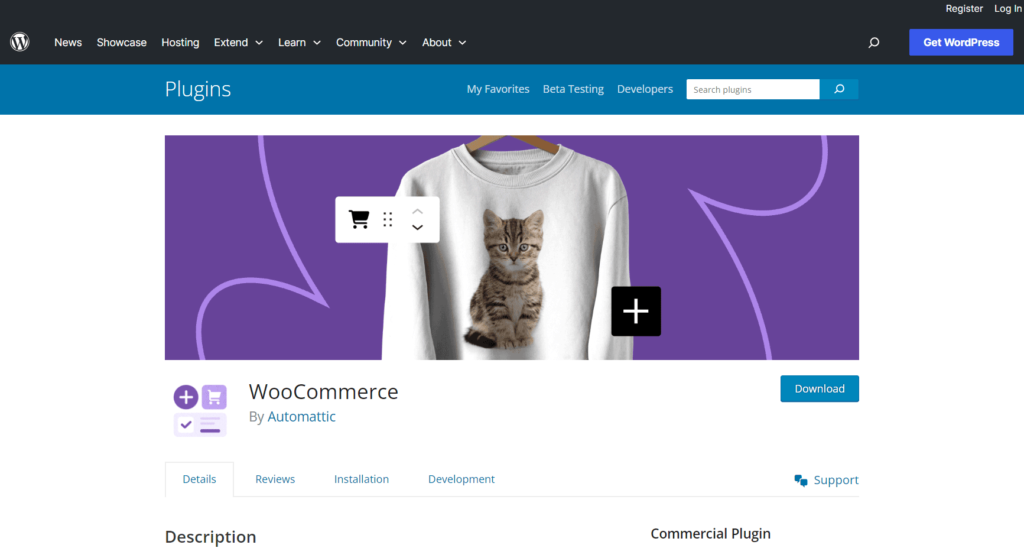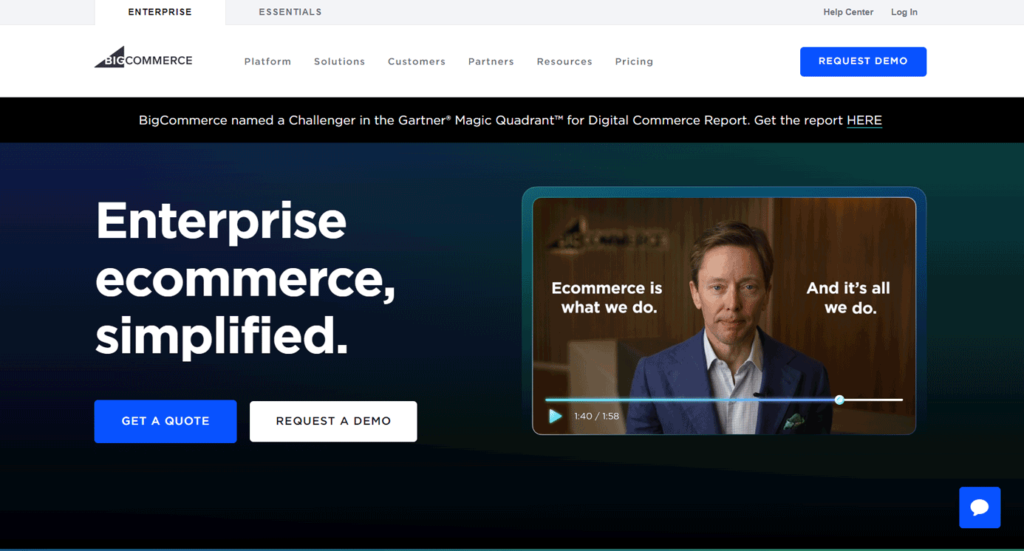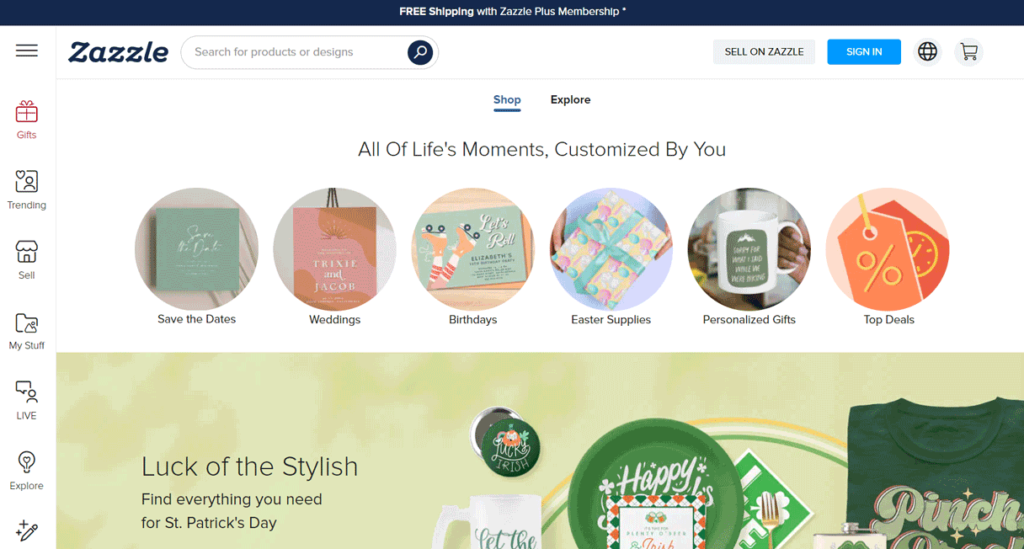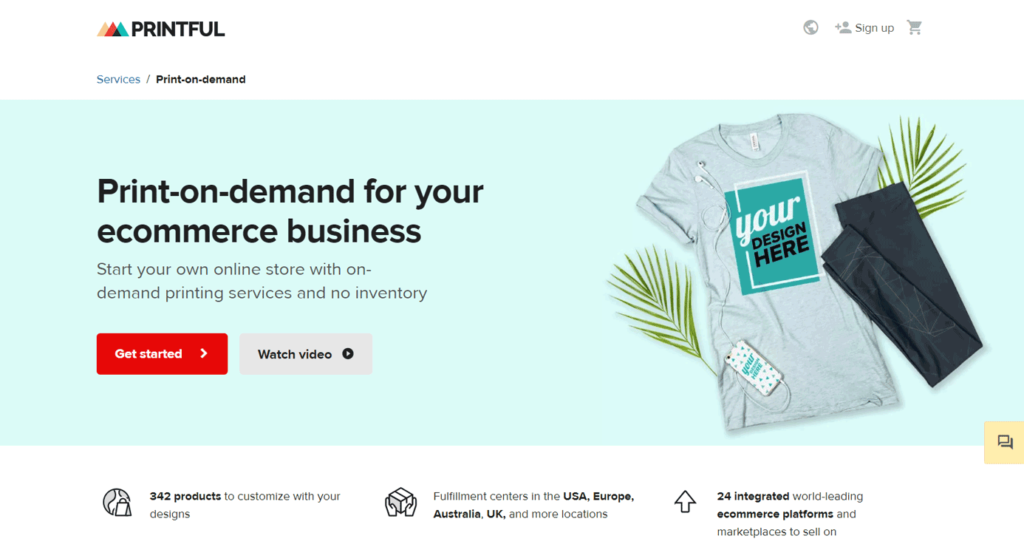Table of Contents
Introduction
Are you looking to dive into the thrilling world of online commerce, ready to carve your niche with unique and custom products? The journey of selecting the best e-commerce platform is akin to embarking on a grand adventure, where every choice shapes the destiny of your business.
The e-commerce platforms are the digital marketplaces, the bustling town squares of the internet, where your business showcases its offerings. On the other side, custom products stand as the artisans’ masterpieces, embodying your individuality and personalization. Together, they form a dynamic duo, enabling you to bring a one-of-a-kind creation to a global audience.
In this fast-paced digital era, the quest for the ideal e-commerce platform to showcase your custom products is both exciting and crucial. It’s more than just an online store; it’s a dynamic stage where your creativity takes center stage, and every click represents a potential connection with a customer who values the extraordinary.
Discover the best e-commerce platforms that will elevate your custom products to new heights:
Shopify
WooCommerce (WordPress)
BigCommerce
Etsy
Zazzle
Printful (for Print-on-Demand)
Overview of Best E-commerce Platforms for Custom Products
How to Choose Best E-commerce Platforms for Custom Products
Pros & Cons of Best E-commerce Platforms for Custom Products
What to Watch Out For Best E-commerce Platforms for Custom Products
Pro Tips
Recap
Shopify
- • Stands out for its intuitive and robust customization options, allowing businesses to effortlessly tailor their online stores to showcase the uniqueness of custom products.
- • Boasts a vast array of apps that cater specifically to custom product businesses, offering additional features and functionalities to enhance the overall shopping experience.
- • Syncs with various tools and applications, streamlining inventory management, order fulfillment, and other critical aspects of running a custom product e-commerce store.
- • Design Shopify’s interface with simplicity in mind.
• Prioritize security as a top concern, as it provides robust features to safeguard sensitive information and earn trust in handling transactions.
• Offer 24/7 customer support.
- • Explore Shopify’s diverse pricing plans, keeping in mind that some users might perceive the transaction fees linked to specific payment gateways and external providers as slightly higher than anticipated.
• Navigate through Shopify’s array of templates, acknowledging that, in contrast to other e-commerce platforms, the selection of free themes might be somewhat limited.
- • Offers a range of pricing plans, including basic, Shopify, and advanced catering.
• Supports an extensive range of third-party apps, allowing your business to enhance its store’s functionality with features like advanced product customization, personalized shopping experiences, and more.
• Ensures that custom product stores are optimized for mobile devices.
MORE >>> OpenCart Ecommerce Platform Review
WooCommerce (WordPress)
• Excels in versatility, seamlessly integrating with WordPress to provide a robust e-commerce solution.
• Offers a vast array of customization options, enabling your business to tailor its online stores to unique specifications.
• Benefits from the support and scalability of WordPress, a widely used and trusted content management system.
• Allows for the integration of various features and functionalities because of the extensive plugin ecosystem.
- • Empowers you with complete control over the design and functionality of your online store.
• Provides a user-friendly interface, making it accessible even if you’re a beginner or experienced user.
• Supports a variety of payment gateways, catering to diverse customer preferences.
• Has active community support, which ensures assistance is readily available.
- • Maintain optimal performance by regularly updating the system, a crucial consideration if you’re seeking a more hands-off approach.
• Encounter potential additional costs from necessary extensions and plugins, despite the core platform being free.
• Overcome challenges posed by advanced customization that demands coding knowledge, particularly for users without technical expertise.
• Experience potential responsiveness issues influenced by the quality of third-party plugins.
• Integrate WooCommerce with WordPress, leveraging its adaptability and extensive customization capabilities, to transform your website into a fully functional and personalized online store.
• Benefit from the vast ecosystem of plugins that WooCommerce offers, providing solutions for various needs and enhancing the functionality of your online store.
• Utilize WooCommerce’s user-friendly interface and strong community support to empower your business to create unique, feature-rich online experiences for your customers.
• Be mindful of the need for regular updates to ensure optimal performance, and consider potential additional costs for advanced customization when using WooCommerce for your e-commerce presence on the WordPress platform.
• Choose WooCommerce as a powerful solution, allowing you to tailor your e-commerce presence on the WordPress platform according to your business needs.
BigCommerce
• Provide a comprehensive e-commerce solution tailored for your business, specializing in custom products.
• Offer a robust platform with scalable features suitable for your small startup or large enterprise.
• Empower your business with intuitive customization tools to create unique and personalized online storefronts.
• Demonstrate a commitment to innovation, ensuring you have access to the latest e-commerce technologies.
- • Tailors to your diverse business needs, making it an ideal choice if you’re dealing with customizable products.
• Presents an array of customizable templates and themes, enabling the creation of visually appealing and unique online stores.
• Prioritizes scalability, empowering your business to grow without facing significant technical limitations.
• Ensures a secure and reliable platform for transactions, instilling confidence in both your business and customers.
- • Navigate a learning curve as a beginner, taking the time to fully harness Webflow’s extensive feature set.
• Customize your website, but be aware that the initial setup process may appear slightly complex for you.
• Evaluate the pricing structure, considering that it may be higher compared to some competitors, especially if yours is a smaller business.
• Implement advanced features with caution, as they may necessitate technical expertise for optimal functionality.
• Tailor pricing plans to your business size and needs.
• Integrate capabilities with various third-party applications and tools.
• Support customers robustly with resources, community forums, and direct assistance.
• Update and improve regularly to ensure the platform remains competitive in the evolving e-commerce landscape.
Etsy
• Stands out as a dedicated platform tailored for artisans and creators, providing a space exclusively designed for the distinctive charm of custom products.
• Fosters a vibrant global community, connecting you with buyers who share a deep appreciation for handmade and personalized items.
- • Showcase your creativity across various categories by offering an extensive array of custom products on Etsy, ranging from personalized jewelry to custom home decor.
• Simplify the listing and selling process for your creations with Etsy’s user-friendly features and intuitive interface, enabling you to focus more on your craft.
- • Employ strategic marketing to distinguish your offerings in the competitive marketplace driven by Etsy’s popularity.
• Factor in Etsy’s transaction fees and additional charges when determining the pricing for your custom products, recognizing the financial implications for sellers.
• Benefit from the supportive community and resources provided by the platform. Etsy offers insights, tips, and forums for collaboration, fostering a sense of community for you.
• Ensure a smooth experience for both you and your buyers. The platform streamlines the process, particularly for buyers purchasing custom products from around the world.
PRO TIPS >>> Best eCommerce Platforms for WordPress
Zazzle
• Stands out for its extensive customization options, allowing your business to create unique, personalized products tailored to your brand and customer preferences.
• Has a vast array of customizable products, ranging from apparel and accessories to home decor and promotional items.
• Offers powerful design tools that empower you to unleash your creativity, facilitating the creation of visually stunning and distinct custom products.
- • Fulfill orders efficiently through Zazzle’s print-on-demand model, reducing the need for extensive inventory management.
• Gain access to a broad online marketplace by listing products on Zazzle, increasing visibility and potential customer reach.
• Ensure that custom products meet high standards in both design and manufacturing, as Zazzle maintains a commitment to quality.
- • Experience a learning curve, especially when utilizing advanced design features, which may require time to master.
• Consider costs carefully to ensure alignment with your budget and profit margins, given Zazzle’s variety of pricing options.
• Rely on Zazzle for manufacturing and order fulfillment, limiting offline control over these aspects.
• Provides various pricing plans, allowing your business to choose the option that best aligns with its budget and sales volume.
• Has an extensive range of categories and items suitable for customization.
• Fosters a community of designers and sellers, offering support through forums, tutorials, and customer service to help your business navigate the platform effectively.
Printful (for Print-on-Demand)
• Offers an extensive range of customizable products suitable for various niches, providing flexibility for your business even with diverse product lines.
• Integrates seamlessly with popular e-commerce platforms, streamlining the process of setting up an online store and managing orders.
• Employs a user-friendly interface, making it accessible for you as a beginner or an experienced entrepreneur in the custom product market.
- • Provides a vast catalog of high-quality products, including apparel, accessories, and home goods, ensuring a wide array of options for customization.
• Handles order fulfillment, including printing, packaging, and shipping, allowing your business to focus on design and marketing.
• Offers warehousing services for custom-branded products, enabling your business to scale without the hassle of inventory management.
- • Set pricing expectations as Printful’s product costs may be higher than competitors, potentially impacting profit margins.
• Navigate potential challenges in controlling production timelines, recognizing that fulfillment relies on Printful’s processing times, subject to variations based on demand.
• Evaluate the impact of substantial international shipping costs, considering how they may affect the competitiveness of custom products in global markets.
• Utilize Printful’s robust product personalization tools to seamlessly add branding and unique designs to your business’s products.
• Employ the platform’s mockup generator to see how your designs will appear on various products, providing a visual preview before making them available for sale.
• Integrate with e-commerce platforms like Shopify, WooCommerce, and Etsy to experience a seamless process of syncing products and efficiently managing orders for your business.
Overview of Best E-commerce Platforms for Custom Products

Dive into the world of personalized products and explore the limitless possibilities with the best e-commerce platforms for custom products available today. These platforms empower you to turn your creative vision into tangible, one-of-a-kind items that resonate with your customers. Shopify stands as a powerhouse for e-commerce, offering an extensive app ecosystem to tailor your store’s functionalities.
Experience the robustness of BigCommerce with its scalable solutions for growing businesses. Buckle up for a thrilling ride and explore these platforms, each a gateway to transforming your custom product dreams into a thriving online business.
How to Choose Best E-commerce Platforms for Custom Products
- Access the scalability of the e-commerce platform, ensuring it can handle the growth of your custom product business.
- Dive into the features and prioritize customization options, ensuring the platform aligns with your unique product offerings and brand identity.
- Opt for platforms with intuitive interfaces that empower you rather than impede your creative process.
- Explore the integration possibilities; seamless connections with third-party tools and services can enhance the overall functionality of your e-commerce venture.
- Opt for platforms offering reliable and responsive assistance to troubleshoot issues and navigate challenges.
- Find a balance between cost-effectiveness and the features necessary to showcase and sell your custom products effectively.
- Gain insights from other businesses that have utilized these platforms for custom product sales.
- Take advantage of free trials or demo versions to ensure the platform aligns with your business vision before committing.
Pros & Cons of Best E-commerce Platforms for Custom Products
Pros
- Enjoy a wide array of design options for your custom products.
- Benefit from advanced personalization features that enable customers to create unique and tailored products.
- Enjoy scalable solutions, accommodating the expansion of your custom product inventory as your business grows.
- Explore a range of product categories, ensuring that your e-commerce store can support customization across various items, from apparel to accessories.
- Experience a user-friendly interface, providing a seamless experience for both sellers and customers navigating the customization process.
- Enjoy integrated payment gateways that facilitate smooth and secure transactions, enhancing the overall shopping experience for your customers.
- Access marketing and analytics tools tailored for e-commerce, assisting you in promoting your custom products and understanding customer behavior.
- Engage with a community of sellers and benefit from customer support services, ensuring that you have assistance when navigating platform-related challenges.
Cons
- Master the platform by adapting to the customization features and acknowledging the potential learning curve that sellers may face.
- Achieve intricate designs by addressing challenges that may arise when integrating highly complex custom product designs.
- Impact overall expenses judiciously by managing costs associated with the use of advanced customization features on the chosen platform.
- Be prepared for ongoing technical maintenance, ensuring the platform’s customization features are up-to-date with potential updates and adjustments.
- Resolve compatibility issues effectively, especially when integrating the e-commerce platform with other third-party tools or software.
- Optimize customization by choosing higher-tier plans on platforms with limitations in customization available in basic plans.
- Ensure customers can navigate the customization process by providing effective education and recognizing potential challenges some customers may face.
- Market your custom products to stand out in the highly competitive marketplace as more sellers embrace customization.
- Venture into the world of custom products by balancing the advantages and challenges presented by e-commerce platforms.
GET SMARTER >>> Best Ecommerce Platforms for Beginners
What to Watch Out For Best E-commerce Platforms for Custom Products

- Dive into the platform’s customization capabilities.
- Scrutinize the design tools provided by the e-commerce platform.
- Consider the flexibility the platform offers in terms of shipping.
- Assess the quality of the product images on the platform.
- Explore integration options.
- Look into the available payment gateways.
- Investigate the accessibility of customer support.
- Consider the scalability of the e-commerce platform.
- Pay attention to both positive and negative feedback to make an informed decision.
- Take advantage of trial periods.
- Understand the costs involved, including transaction fees and subscription plans.
- Choose an e-commerce platform that prioritizes SEO features, helping your custom products reach a wider online audience.
- Ensure mobile responsiveness.
Pro Tips
- Use color schemes, fonts, and visual elements that resonate with your brand identity.
- Prioritize high-quality visuals for your custom products.
- Keep the customization process simple and user-friendly.
- Communicate the range of customization possibilities available.
- Encourage customers to share their customized products on social media.
- Let customers see how their customizations will look before finalizing their orders.
- Optimize your custom product platform for mobile users.
- Clearly outline how customization options may affect the final price. Avoid surprises during the checkout process to build trust with your customers.
- Ensure your e-commerce platform has robust security measures to protect this sensitive information.
- Enable and encourage customer reviews.
- Showcase testimonials and success stories.
- Simplify the checkout process.
Recap
Today, more than ever, consumers crave unique, one-of-a-kind items, and the platforms dissected offer an exciting array of features to cater to this demand. In this dynamic e-commerce arena, whatever your business’s size or niche, these platforms serve as potent allies, empowering you to embark on a journey of limitless creativity and unprecedented customer satisfaction. Choose your platform wisely, and let your brand’s unique essence shine in the world of e-commerce.













